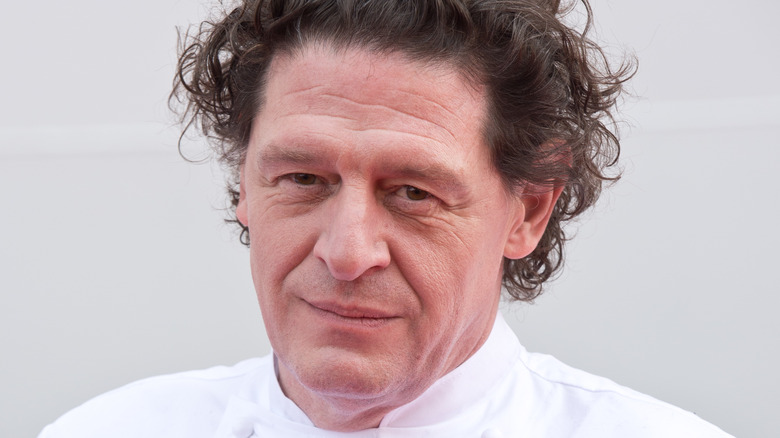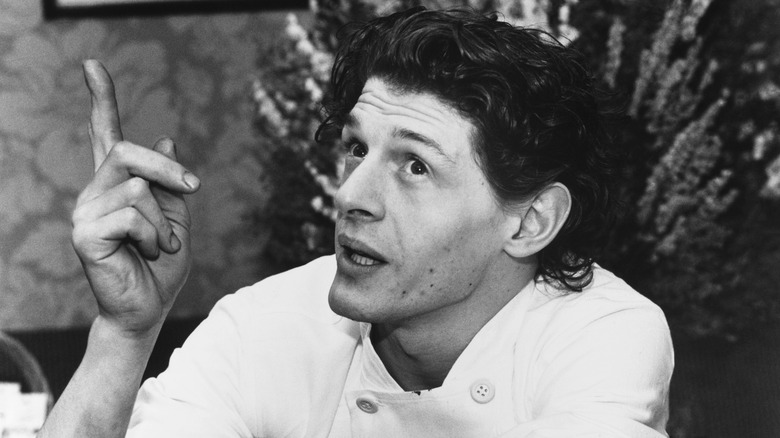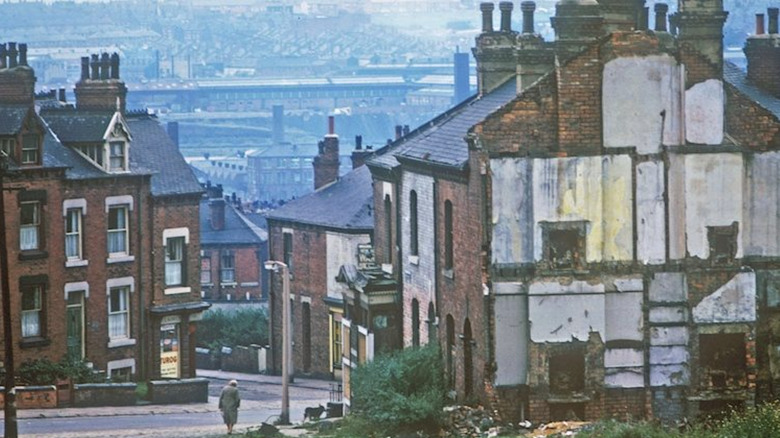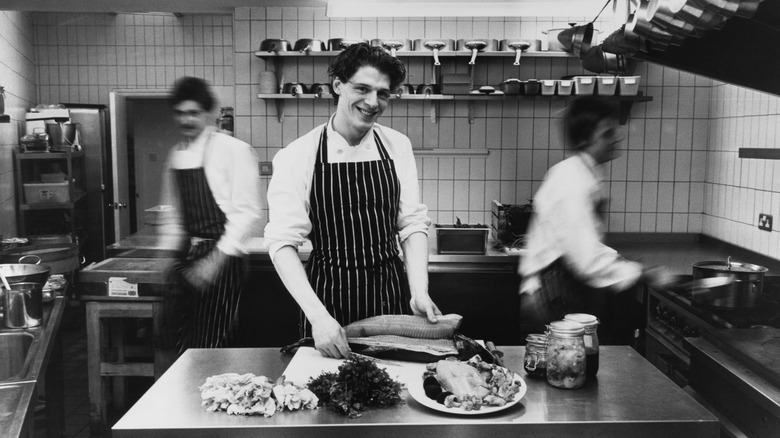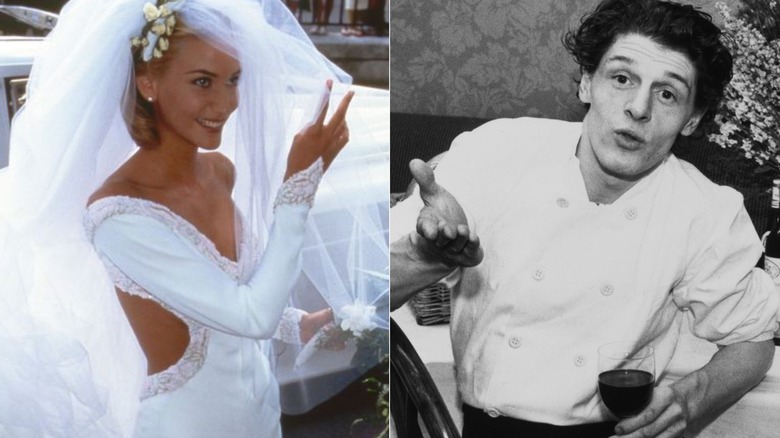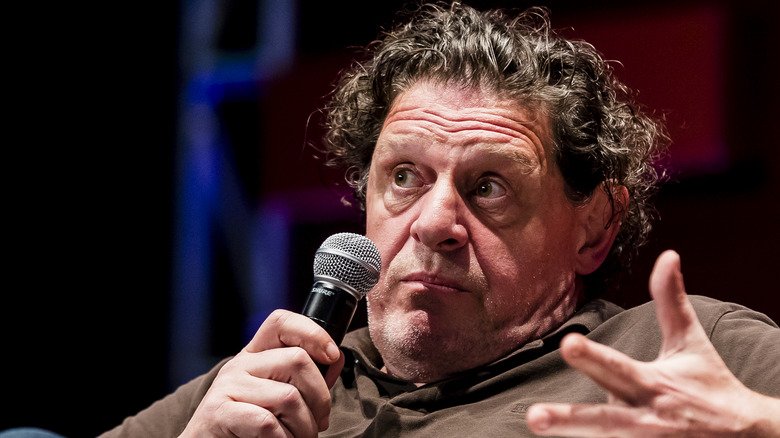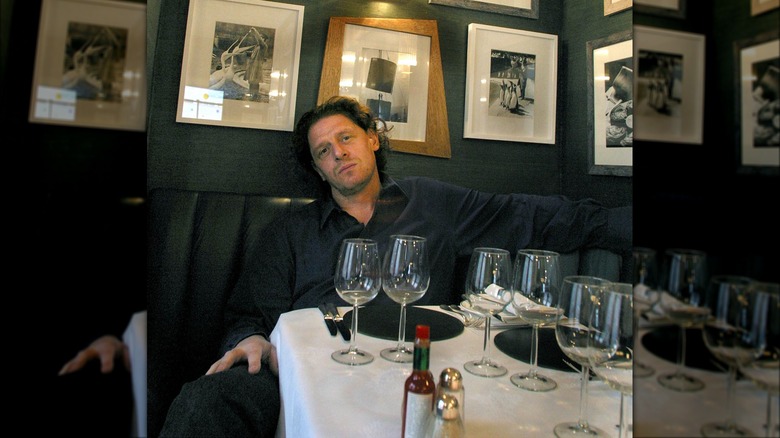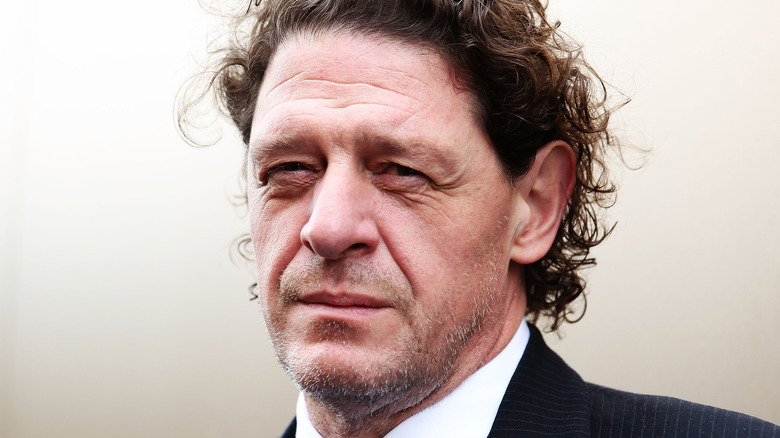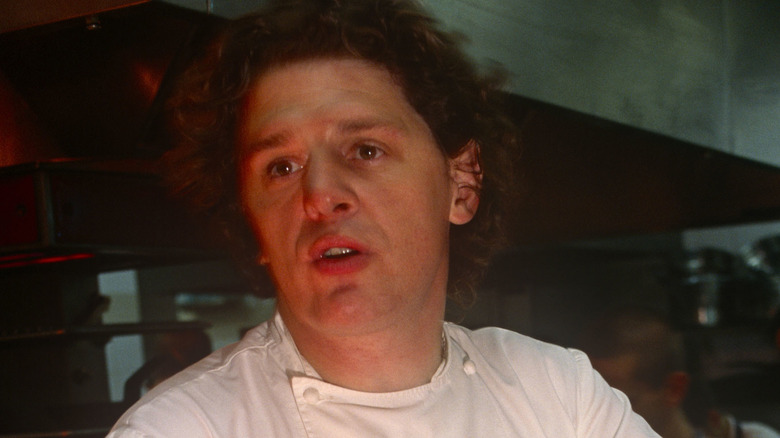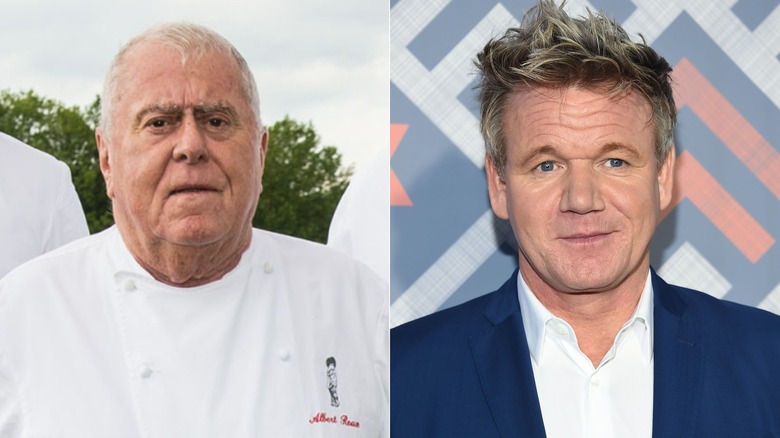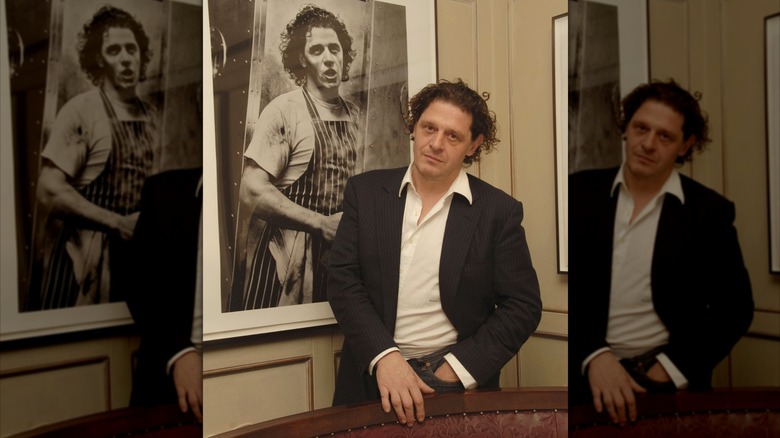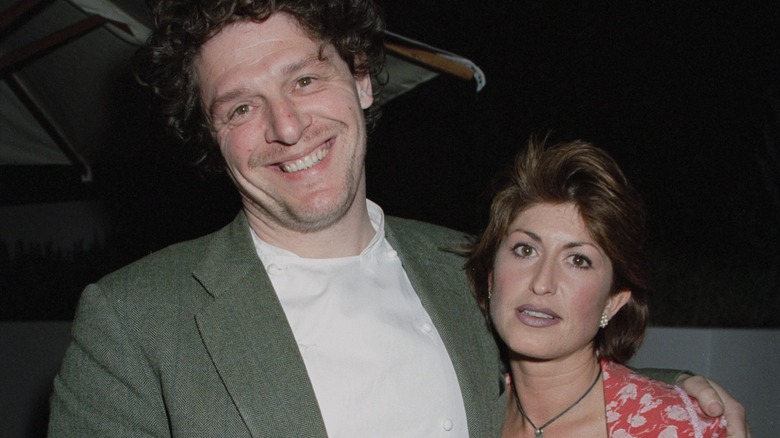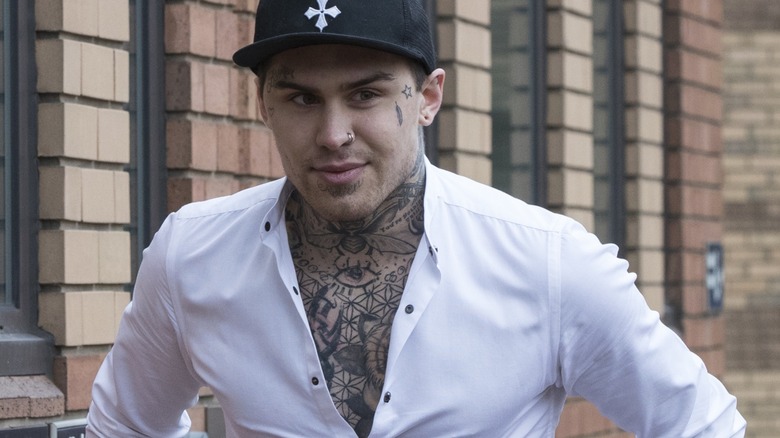Tragic Details Of Marco Pierre White
The era of the bad boy chef has come and gone, mostly due to unchecked rage and 100 hour work weeks no longer being accepted by society. Back when rockstar antics ruled fine-dining kitchens worldwide, no one was hotter than Marco Pierre White. His autobiography-meets-cookbook "White Heat," published in 1990, shattered any collective illusion that a Michelin-starred chef had to look or act conservatively. It also revealed tragic details about White.
In his heyday, White's brooding, disheveled elegance made him (a little too) popular with the ladies, while his brash, often cruel kitchen behavior was seen as uncompromised passion by young chefs who were desperate to emulate him. All the while, a sadness in his dark eyes remained, burning low and slow beneath the surface. Success could not erase White's difficult childhood, repair his broken relationships, or quell his disdain for the industry that made him a legend. For all his arrogance and dismissiveness, the somber sensitivity in White's eyes betrays any tough guy persona he's tried to uphold.
He has shown vulnerability. In his 2006 memoir "The Devil in the Kitchen," White describes how cooking was the only constant in life. He became obsessed with it, and this paid off in some ways, but could never fully remove darkness from White's life. These are some of the tragic moments endured by one of the world's great chefs.
He is haunted by his mother's death
Marco Pierre White was born in Leeds, England in 1961, the son of an English father and Italian mother. The couple had four boys, with White being the third. Barely two weeks after giving birth to her fourth son, White's mother, Maria-Rosa, suffered a fatal brain hemorrhage at the age of 38 due to a postnatal complication.
White says he recalls the day his mother died with complete clarity. He remembers coming into the house with his father, and his mother asking him to take the baby because she wasn't feeling well. He then watched his mother drift in and out of consciousness. White's father sent him and his brother upstairs when the ambulance came. White watched his mother being carried out of their home and put inside the ambulance. It was the last time he ever saw her. He was 6 years old.
White clings to the memories from their short time together: summers spent in Italy, toys and clothes she made, and the simple pasta dishes she cooked, reminiscent of the Genoa region, where she was from. Conjuring these images is enough to bring tears to the chef's eyes. As he told The Guardian in 2015, "I am my mother's son – gentle and sensitive."
He grew up in poor household with a domineering father
In his mother's absence, life for Marco Pierre White wasn't easy. His father, who had eradicated all trace of his wife from the home, began drinking heavily and spending his days at the race track, betting on greyhounds. This caused financial problems for the family. In an effort to alleviate the money troubles, White's father grew vegetables in a backyard garden and encouraged his three oldest boys to hunt small game, fish, and forage in nature — practices White came to love. White's infant brother Craig, however, was sent to live with a maternal aunt and uncle in Genoa, Italy. White saw his brother, whose name was changed to Simon, very little after that.
In 1972, White's father was diagnosed with lung cancer and given five months to live. The tragic news gave 10-year-old White a deep fear of death that he was never able to shake. White's father did not die in a matter of months, however, and passed away in 1997. White's male-dominated household was a strict one, made even tougher on account of his father's disciplinarian tactics. Terrified of letting his father down, White developed a nervousness from the stringent environment and became a chronic bed-wetter. White describes his child self as an introvert who sought solace in nature and spent a lot of time alone.
He struggled with dyslexia and left school at 16
Marco Pierre White's introverted personality and love of the outdoors weren't exactly a recipe for enjoying school, but that wasn't his main reason for disliking academics. White was plagued with a condition known back then as "word blindness" that made reading very difficult. According to White, word blindness was regarded in the classroom as a sign of stupidity, causing him to feel intense shame. Looking back, White understands that he was (and is) dyslexic, it just wasn't something kids were diagnosed with in the 1960s. For White, reading aloud in class was a source of embarrassment, and his struggles with reading and spelling continued into high school. At age 16, White dropped out.
White didn't discover cooking through passion or even curiosity, it was simply his family's line of work. As he told The Guardian, "I finished school on the Friday, and I started work on the Monday, in the profession of my father, uncle, grandfather and brothers. That was what working-class boys did: they entered a trade." His father said being a chef was a stable job because people always needed to eat. White quickly found an opening at the nearby St George Hotel and worked his way up. Right away, he found comfort in kitchen life, where he was able to express himself through his hands, rather than the written word.
His first two marriages ended quickly
If you ask Marco Pierre White, the only woman he ever truly loved was his mother, and her untimely death left an emotional hole that could not be filled. This didn't deter him from the pursuit of romantic love. He met his first wife, Alex McArthur, at the fishmongers in 1987, shortly after opening Harveys — the south London restaurant that made him famous. They became a couple after their first date and married in 1988. White was 26 at the time.
They welcomed a daughter, Leticia, in 1989, and although White was delighted by fatherhood, his emotional immaturity didn't allow him to embrace his role as a parent or husband. By 1990, the marriage was over. White gave marriage another try in 1992, with model Lisa Butcher. The pair crossed paths at London's Tramp nightclub — he proposed three weeks later.
White claims he was bewitched by Butcher's looks and didn't consider that their personalities were misaligned. When Butcher wore a designer wedding dress with embellished cutouts for their special day, White publicly stated that her getup was better suited to the catwalk than the church aisle. Within 15 weeks, they split. As for future romance? White told The Standard in 2012, "I'll always roll those dice. If there were two dice on the table right now and you could roll them for love, would I do it? Yes, every time."
He worked excessively to numb his emotional pain
"Work is the greatest painkiller known to man. Gastronomy is the greatest form of therapy any misfit can be exposed to" Marco Pierre White explained to Gentleman's Journal. A desire to flee from the insecurities and emotional trauma he experienced in childhood was the catalyst for his illustrious career.
By 18, White was making a name for himself at the highly-regarded Box Tree restaurant, where he worked as the pastry chef. In 1981, he went to London, penniless but with an unrelenting will to become great. There, the tenacious 19-year-old found work at Le Gavroche, and he began his classical training under famed French chef Albert Roux.
During his Michelin Star days, White often worked 100-hour weeks. His oft-unkempt mane of waves and angular cheekbones that became his signature look, were the product of an unrelenting schedule and a diet of espresso and Marlboro Reds. In his book, "The Devil in the Kitchen," White described Harveys as the ideal setting for his addictions to work, adrenaline, and pain. He said that for chefs back then, chronic obsession and sacrificing one's health for their career was all the rage.
His temper was abusive at times
As Marco Pierre White rose through the ranks of fine dining gastronomy, he was respected and feared in equal measure: respected for his punishing work ethic and sheer skill, feared for his volatile temper. Pre-Harveys, White briefly ran the pub kitchen at Six Bells in London, where he worked with an experienced young chef named Mario Batali. Four months in, Batali quit after White threw a pan of risotto at his chest. "He was a mean mother*****r," Batali recounted to The New Yorker in 2002.
At Harveys, the flare-ups continued. In "The Devil in the Kitchen," White describes forcing cooks to stand in the corner and watch him work if their performance didn't meet his expectations. He hung a chef on coat hooks by his apron and threw jars of sauce at underlings — much to the horror of a film crew interested in filming a TV show there. White's rationale was that a chef who doesn't fear the boss takes shortcuts, and a chef who takes shortcuts will never become the best.
White maintains that in the heat of service, antics like these were a sharp wake-up call to chefs who needed to step up their game. In retrospect, he admits slashing the back of a chef's jacket and pants with a carving knife for complaining that the kitchen was too hot, wasn't safe behavior. As for that notorious instance of bringing Gordon Ramsay to tears? White claims no responsibility — Ramsay made himself cry.
The British tabloids have relentlessly pried into his personal life
Flirting with models between courses, ejecting diners from Harveys for criticizing the food or making self-important requests, and being unapologetic about it all, quickly earned Marco Pierre White a bad boy reputation. The dramatics at Harveys — one of the hottest restaurants in late '80s London — intrigued the prying eyes of the British tabloids. Back then, White did not consider himself a celebrity. After receiving his second Michelin star, at age 28, White's media presence widened, and seldom waned thereafter. Private conversations were habitually leaked to the press. His actions were scrutinized, and the lives of people close to him were considered fair game as well.
Problems in his marriages were a hot topic. It began when he wed his second wife, Lisa Butcher in 1992, after word got out that the pair's union was on the rocks following their honeymoon. When his third marriage headed toward a contentious separation, the press tracked the story. White and wife Mati Cornejo's private anguish was public fodder, with paparazzi photos of their comings and goings regularly published by tabloids. White's kids were also targeted. His eldest son Luciano's restaurant failings and youngest son Marco Jr.'s legal troubles were printed for the public's amusement.
At age 38, he returned all of his Michelin stars
In 1995, Marco Pierre White received his third Michelin star. At 33, he was the world's youngest, and first British chef to accomplish this. He was also the first chef to give his stars back. At one point, White was desperate to receive three stars. He felt that Harveys, where he'd earned two, was too small to earn another. He left in 1993 and opened Restaurant Marco Pierre White at London's Hyde Park Hotel.
Within a few years, disillusionment set in. White transferred his stars from the Hyde Park Hotel to The Oak Room, yet with three stars being the highest a restaurant can receive, he had reached the end goal. Maintaining the stars became the only expectation, and the thought of this exhausted him. He hated thinking that down the line, his name would be on the door of a Michelin-starred restaurant he wasn't actually cooking in. He also resented Michelin's judgment, considering himself more knowledgeable than their institution, which makes tires. In 1999, he returned the stars and stepped away from the stove.
Free from kitchen life, White sought to relive the childhood he never had. He returned to nature, and in an emotional sense, returned to himself. He spent time with his family and began processing decades' of repressed feelings from the past. To Gentleman's Journal, White said, "By hanging up my hat and saying: 'no more' ... now I don't have to live a lie."
He has a history of feuding with famous chefs
Marco Pierre White's personal relationships with fellow culinary behemoths hasn't always been pleasant and his most high-profile feud was with Gordon Ramsay. To this day, Ramsay cites White's influence at Harveys as his greatest learning experience as a chef, but their past wasn't always so rosy.
In 2007, Ramsay admitted to The New Yorker that in '98 he faked the theft of the reservation book at his London restaurant Aubergine and blamed White. White threatened legal action after the admission was published. Truth was, he'd been annoyed with Ramsay since 2000, when the chef showed up to White's wedding with a camera crew in tow. They have seemingly buried the hatchet though, and are on better terms in recent times.
Similarly, White didn't hide his disdain for once-beloved mentor Chef Albert Roux. He once likened Roux as a father figure, but after learning that Roux was behind his denial of a "Chef of the year" prize at a UK awards ceremony, and dubbed him as "bad for cooking" the relationship was severed. Despite the contention, White maintained that Roux was exceptionally talented, but carried a chip on his shoulder. In 2007, a journalist for Express spoke to several of White's former associates. "One of them told me that Marco drops you if he thinks he can no longer bully you. Another said it is because 'I might have found him out.'"
One of his most famous collaborators died tragically
The enduring legacy of Marco Pierre White's seminal 1990 cookbook "White Heat" has a lot to do with the photos. The black and white images, taken by Bob Carlos Clarke, exquisitely captured the fleeting greatness of White and his brigade at Harveys and immortalized White's enfant terrible image in the kitchen. Those photos remain the most recognizable shots ever taken of White and are among the best. In March 2006, Clarke's life was cut short by tragedy.
At age 55, Clarke jumped in front of a train in London. He left behind a wife of 30 years and a teenage daughter. Though famous in the art world for his racy portraits, Clarke had a long, debilitating battle with depression. Decades before, Clarke found himself in the right place at the right time — that being Harveys in the late 1980s. There, he observed a prolific albeit surly White, helming a kitchen on the verge of British gastronomical history. In a mixture of candid and posed shots, Clarke created an intimate portrait of the young chef, who was poetic, vulnerable, and ruthless all at once.
White felt the loss. When "White Heat 25," an updated version of the book released in 2015 was dedicated to Clarke. White said he had only agreed to re-release it out of a sense of responsibility for Clarke's daughter, Scarlett. "Without Bob there would never have been White Heat." he said after his friend's death.
If you or someone you know is struggling or in crisis, help is available. Call or text 988 or chat 988lifeline.org. Or if someone you know needs help with mental health, please contact the Crisis Text Line by texting HOME to 741741, call the National Alliance on Mental Illness helpline at 1-800-950-NAMI (6264), or visit the National Institute of Mental Health website.
His third marriage was a rollercoaster of drama
In "The Devil in the Kitchen," Marco Pierre White recounts meeting his third wife, Matilde Conejero, known as Mati, when she was the bar manager at The Canteen, White's restaurant venture with the actor Sir Michael Caine. White had been a staunch upholder of never dating co-workers — an ethos he extended toward his staff. Yet as his connection toward Conejero became undeniable, he made an exception. The couple married in 2000. By then they were already the parents of two sons (daughter Mirabelle was born soon after). By the mid-2000s, Conejero and White's relationship turned sour.
In 2005, White spent 14 hours in a holding cell after a domestic dispute with Conejero, who later dismissed the charges. The jealousy and fighting continued, leading Conejero to file for divorce in 2007. By 2012, the couple's legal fees stretched upwards of £3 million. Conejero was sentenced to 40 hours of community service in 2012 after she smashed the windshield of White's Range Rover and scrawled insults in the entryway of his home with nail polish and her own blood. In 2015, Conejero was accused of attacking her sons, but the case was dropped due to lack of evidence. As of 2024, the estranged couple are still legally married.
His son has struggled with substance abuse
White is a devoted father to his four children and has said that the fruits of his labor allowed him to give his kids a top-tier education and a comfortable upbringing. Even so, Marco Pierre White Jr., White's youngest son with wife Mati, has struggled immensely with substance abuse. The double-edged sword of nepotism has plagued many celebrity children, yet for White Jr., now 29, a life of privilege hasn't been enough to keep him outside of prison walls.
White Jr.'s introduction to drugs began at the tender age of 13. His addictions soon spun out of control, leading to a string of arrests. Beginning in 2022, he spent a year in jail, the result of multiple shoplifting charges, possession of a knife, possession of heroin, and racial abuse toward a security guard. White Jr. didn't want his father to visit him in jail, for fear it would attract unwanted press attention for the chef. Instead, they had daily phone conversations. White Jr., who has a young daughter, maintains that even in the toughest of times, his father has always loved and supported him.
While in jail, White Jr. converted to Islam and vowed to live a clean and sober lifestyle. Sadly, his troubles persisted. In May 2024, he was arrested for smashing his way into a delicatessen with a champagne bottle, stealing £250 from the cash register, and making off with the tip jar. This resulted in a 41-week jail sentence.
